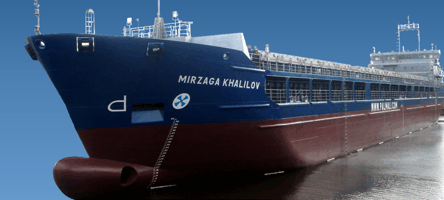 08.10.12 12:16 08.10.12 12:16
The International Ship and Offshore Structures Congress (ISSC 2012) was completed
 The International Ship and Offshore Structures Congress (ISSC) has been taken place in Rostok from September 9 till September 13, 2012. The International Ship and Offshore Structures Congress (ISSC) has been taken place in Rostok from September 9 till September 13, 2012.
Congress was carried out by Rostok university.
ISSC Congress is the most well-known and respected forum of specialists of existing science conferences and symposia in the sphere of ocean structure and vessel designing.
The aim of the congress ISSC and their committees, which work between congresses is to consider the research about different scientific directions, to form a generalized assessment of their interpretations, to disseminate the results of the last researches among the international community and to identify areas for future researches, to form the propositions and measures of elaboration the calculation methods, rules of the classification societies, regulations of the International Maritime Organization and other international organisations concerned with the creation of ships and ocean engineering resources, and the development of generally accepted methods for using them in the international practice.
Since the 1st ISSC 1961 in Glasgow, about 200-250 chief specialists of almost all shipbuilding countries listen to the committees' reports of basic directions of shipbuilding science in all her aspects, discuss gained results and discovered problems, vote for new committee members for the next period every 3 years.
ISSC explores vessel's construction, sea constructions and any other oceans facilities that can be used for transportation, exploring and operation of sea resources (from classical bulk-carriers and drilling platforms and to yachts, battleship, floating aerodromes, floating oil storages).
ISSC congresses history:
1st ISSC 1961 Glasgow;
2nd ISSC 1964 Delft;
3rd ISSC 1967 Oslo;
4th ISSC 1970 Tokyo;
5th ISSC 1973 Hamburg;
6th ISSC 1976 Boston;
7th ISSC 1979 Paris;
8th ISSC 1982 Gdansk/Paris;
9th ISSC 1985 Genova;
10th ISSC 1988 Lyngby;
11th ISSC 1991 Wuxi;
12th ISSC 1994 St.Johns;
13th ISSC 1997 Trondheim;
14th ISSC 2000 Nagasaki;
15th ISSC 2003 San Diego;
16th ISSC 2006 Southampton;
17th ISSC 2009 Seoul.
18th ISSC 2012 Rostok.
About 220 chief specialists from 30 countries participated into ISSC 2012. Reports of 16 science committees were listened.
Marine Engineering Bureau (MEB) representatives participated actively in the work of 5 committees:
1. In committee I.1 "External conditions" - report co-author senior researcher of MEB, Ph.D. Aleksandr Nilva.
2. In committee I.2 "Loads" - report co-author, MEB leading researcher Ph.D. Igor Davydov.
3. In committee IV.1 " Design Principles and Criteria " - report co-author MEB general director, professor, Sc.D. Gennadiy Egorov.
4. In committee IV.2 "Design Methods" - the 1st deputy director, general chief designer Igor Illnytski.
5. In committee V.7 "Impact loads and their effects on the vessel's hull" - senior researcher of MEB, associate professor of the Odessa National Maritime University, Ph.D Sergey Baskakov.
After active discussion ISSC congress members approved listened reports and chose new committees' membership of ISSC congress 2015.
MEB representatives were included in committees as follows:
1. Committee IV.1 " Design Principles and Criteria " - MEB general director, professor, Sc.D. Gennadiy Egorov (member of ISSC since 2000).
2. Committee IV.2 "Design Methods" - the 1st deputy director, general chief designer Igor Illnytski.
3. Committee V.1 "Researches of limiting emergency conditions" - senior researcher of MEB, Ph.D. Aleksandr Nilva (member of ISSC since 2007).
4. Committee V.7 " Structural longevity " - senior researcher of MEB, Ph.D Sergey Baskakov.
New ISSC congress 2015 will be held in Lisbon, Portugal in 2015 (Gvedesh Carlos-Soares, the famous scientist, Professor of Technical University of Lisbon was elected as the president of the congress, Jordan Gorbatov was elected as the Professor Secretary).
List of ISSC 2012 committees:
Committee I.1 - Environment;
Committee I.2 - Loads;
Committee II.1 - Quasi Static Response;
Committee II.2 - Dynamic Response;
Committee III.1 - Ultimate Strength;
Committee III.2 - Fatigue and Fracture;
Committee IV.1 - Design Principles and Criteria;
Committee IV.2 - Design Methods;
Committee V.1 - Accidental limit states;
Committee V.2 - Natural Gas Storage and Transportation;
Committee V.3 - Materials and Fabrication Technology;
Committee V.4 - Offshore Renewable Energy;
Committee V.5 - Naval Vessels;
Committee V.6 - Artic Technology;
Committee V.7 - Structural longevity;
Committee V.8 - Risers and pipelines.
|



